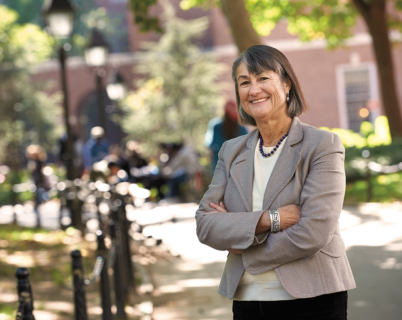Article begins

Image description: A woman with dark brown and grey hair wears a light brown blazer and cream colored shirt. She stands outside during the day and smiles with her arms crossed. In the distance behind her, there are people, trees, and a brick building.
Caption: Sally Engle Merry. ©Thomas: Courtesy of NYU Photo Bureau
1945–2020
In life, Sally Engle Merry was a charismatic presence and a clarion voice in the profession, championing anthropology and especially the students and scholars ready to take the discipline in new directions. She brought a distinct and influential originality to the fields she brought together—anthropology, law, and sociolegal studies. Internationally renowned, especially for her work on transnational law, Merry was a global figure within and beyond the field. Her intelligence, energy, imagination, and analytic chops were extraordinary, as were the intellectual generosity and warmth that infused her many collaborative projects.
Merry displayed an exemplary capacity for shaping research and writing projects that were theoretically and methodologically pathbreaking. She spoke with real insight—and gravity—to key questions of social justice, policy, and institutional transformation. Her early work on “getting justice and getting even” in a suburban US neighborhood led her to larger scale engagements with the paradoxes of legal liberalism, including studies of popular justice in US cities and her historical ethnography of colonial Hawai’i. Her Hawai’i study offers a detailed analysis of US judges’ constructions of their own powers to deal with local matters they understood categorically as—and thereby brought into being—attributes of indigeneity, gender, class, and race. Her historical and anthropological scholarship on the cultural life of colonial and postcolonial law in Hawai’i and the Pacific has been central in shaping subsequent scholarship.
Merry’s attention to the intimate hegemonies wrapped up in transnational law, also shapes the sense of problem Merry brought to the complex and lively transdisciplinary tangle of law and society research, an arena in which she made major contributions and had long been a catalyst. Her important work on human rights in the context of violence against women made vivid her commitment to understanding and helping to change the world of policy and practice. She drew upon sophisticated and wide-ranging research strategies toward those ends. Her recent work on indicators and quantification broke new ground as ethnographies of neoliberal technologies of governance, power, and knowledge. All in all, Merry demonstrated a keen sense for where the interpretively rich and revelatory sites, institutions, and practices lay—and how best to understand them, whether in district court clerks’ offices, United Nations bureaus, NGOs, or mediation sessions.
Merry was an exceptionally humane scholar and colleague. She was famously an engaged and effective scholarly citizen, both in anthropology and the American Anthropological Association and within the Law and Society Association. The offices she held, including the presidencies of the Association for Political and Legal Anthropology, American Ethnological Society, and the Law and Society Association, as well as committees she chaired and other organizational roles she took on made for a remarkable record. More significant, were the intelligence, organizational savvy, collegial openness, and capacity for leadership that imbued that work. Her contributions to our collective scholarly life drew upon the same well-cultivated instinct for organizational analysis—and for really understanding the stakes, both individual and institutional, central to social process—that marked her scholarship. She defended (without dogma) the value of the profession as an enduring institution at the same time that she worked tirelessly to make room for new participants and innovative practices. She earned many honors, including an honorary doctorate in law from McGill University, the J. I. Staley Prize, and AAA’s Franz Boas award; she also earned an extraordinarily wide circle of esteem and affection.
Merry was wonderful company, always a lively presence. She was avid and skilled in the outdoors—literally and figuratively a trailblazer and climber of mountains. She relished the discoveries that came with traveling the world, and the friendships that wove the world into her life. Merry died on September 8, 2020, at the age of 75. She is survived by her husband Paul H. Merry, their children Joshua and Sarah, and her brother Robert. Merry dedicated her last book to the memory of her twin sister, Patricia. As the state of the world draws ever-sharper attention to the sorts of questions of accounting and accountability that Merry pursued, those who knew her—and many who did not—will miss her voice.
(Don Brenneis and Carol Greenhouse)
Cite as: Brenneis, Don and Carol Greenhouse. 2020. “Sally Engle Merry.” Anthropology News website, September 18, 2020. DOI: 10.14506/AN.1501

